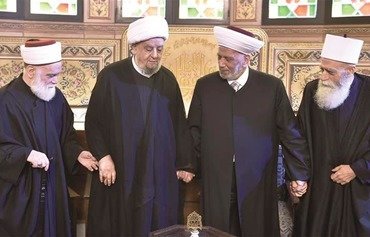Religious celebrations such as Eid al-Adha provide a chance for peaceful co-existence amid a regional climate of sectarian tensions, Lebanese clerics and citizens told Al-Mashareq.
Signs of religious co-existence between Sunnis and Shia "are clear in Lebanon", said Mohammed al-Naqri, a sharia judge from Zahle in the Bekaa Valley.
"This transcends political tensions between the two sects," he told Al-Mashareq, and can be seen on a number of occasions.
"While we can observe tensions between political rivals among Sunnis and Shia due to certain political issues and a political chasm, religious co-existence is not affected," he said, as religious celebrations are "one and the same".
"For example, Eid al-Adha celebrations, which are happening now, are the same for both Sunnis and Shia with their numerous shared rituals," he said.
These religious occasions offer people a chance to come together and exchange greetings, he said, adding that during feasts such as Eid al-Adha, delegations from Dar al-Fatwa and the Supreme Islamic Shia Council exchange visits.
"Religious celebrations offer an opportunity to get together and reinforce religious co-existence," he said.
This type of co-existence is "a defining characteristic of Lebanon, which is known for its multi-sectarian nature", he said.
Solidarity across sects
"Eid al-Adha has managed to bring Sunnis, Shia and Druze sects together, since religious and national occasions and even occasions celebrated within a certain sect confirm there is solidarity among us," al-Naqri said.
"As Sunnis, we at the Dar al-Fatwa join our Shia brothers during Ashura gatherings, and they recite hadiths and celebrate the Prophet’s birth with us," he added.
Sectarian allegiance manifests at certain times when the political interests of parties claiming to represent the various sides clash, said journalist Ibrahim Haidar, a Shia who writes for an-Nahar newspaper.
Political forces rally their members and dial up their intolerance for the other side when they need to, but when there is consensus, "you see a cooling down of emotions and stability", he told Al-Mashareq.
Political conflicts imbued with a sectarian nature bolster sectarian identity, Haidar said, adding that sectarianism is in turn reinforced in terms of its crossover with political issues.
"In this light, you see a resurgence of the historical disputes, killings and contentiousness, and this prevents the building of strong relationships and lasting co-existence," he said.
"This happens during times of conflict," he added, stressing that "there is calm between both sects during joint religious celebrations".
'Same for all Muslims'
Eid al-Adha, for example, is the same for all Muslims, who have performed the same hajj rituals together for centuries, Haidar said.
Despite the political rifts between the two sects, he said, there are rational minds on both sides that believe in the importance of religious co-existence.
Feasts such as Eid al-Adha provide a chance to return to the principles of a tolerant Islam, said Dahlia Shbarou, a Sunni who lives in Beirut.
"Religious occasions and their rituals prove this tolerance that we, as Muslims, long for, whether we are Sunni or Shia in particular, and above all, as Lebanese," she told Al-Mashareq.
Eid al-Adha "is, for me, another opportunity to strengthen my relationship with Shia with whom I share the same concerns, and I do not make room for the Sunni-Shia strife to affect my relationship with them", she said.
Lebanese people are not fooled by conflict and political strife that is unfurled under the guise of religion, she added, noting that religious celebrations provide opportunities for Lebanese to reinforce and cement religious co-existence.

![Sheikh Amin al-Kurdi, Dar al-Fatwa secretary in Lebanon, delivers the Eid al-Adha sermon at Mohammad al-Amin mosque in Beirut. [Photo courtesy of Lebanon's National News Agency]](/cnmi_am/images/2016/09/14/6171-Lebanon-beirut-mosque-600_384.jpg)






